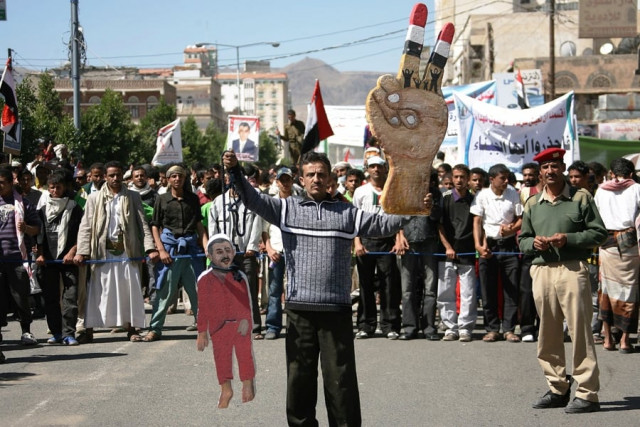Yemenis vote as Saleh's 33-year rule ends
Yemen's new president will rule for interim two-year period.

The referendum-like poll, in which Saleh's deputy Abdrabuh Mansur Hadi is standing as the sole consensus candidate, is being boycotted by two major opposition groups; the separatist Southern Movement and the northern Shiite rebels.
But the main proponents of the uprising that began in January 2011 have asked Yemenis to throw their support behind Hadi, whose posters have been plastered across buildings and throughout the streets of the capital Sanaa.
Hardline factions of the Southern Movement have gone as far as calling for preventing the election from taking place at all, and making Tuesday a day of "civil disobedience" to disrupt voting.
Attacks on polling stations and clashes between troops and anti-election protesters in the south have raised fears that polling day could be marred by violence.
Such fears have prompted authorities to deploy 103,000 soldiers to guard polling stations, said Mohammed Yahya, chairman of the Electoral Commission.
Hadi, himself a southerner, pledged on Sunday to southern separatists and northern rebels that he will address their concerns, saying that "dialogue and only dialogue" can resolve these long-standing conflicts.
Yemen's new president will rule for an interim two-year period, after which presidential and parliamentary elections will be held, a condition of the Gulf-brokered transition deal signed by Saleh in November.
However Saleh's shadow looms large over Tuesday's vote.
The veteran strongman maintains a strong hold over the most powerful security forces and there is also speculation that he might return from the United States, where he is receiving medical treatment, as soon as Wednesday.
In a speech published on state news agency Saba Monday, Saleh, spared the fates of his ousted Arab counterparts, urged Yemenis to vote for his deputy to ensure a "peaceful" transition of power.
Autocrats in Tunisia and Egypt were forced to resign last year, bowing down to mass uprisings.
In Libya, rebels backed by NATO forces captured and killed dictator Moamer Kadhafi in October.
Polling stations in Yemen open at 8:00 am (0500 GMT) and results are expected in the two following days, although under Yemeni law it can take up to 10 days before full results are announced.
More than 12 million Yemenis are eligible to vote -- 10 million registered in the last elections in 2006 in addition to 2.2 million new voters.
The turnout in the single-candidate election will give some idea of the support 66-year-old Hadi has from his countrymen to lead the transitional period.
In a televised speech on Sunday, Hadi promised "radical reforms" and stressed the need to reunify the army.
The military has been divided since last March when some units defected to support the uprising against Saleh's rule.
Hadi also pledged to fight al Qaeda and its growing influence in the lawless south and eastern provinces, where the militants have seized several towns in recent months.



















COMMENTS
Comments are moderated and generally will be posted if they are on-topic and not abusive.
For more information, please see our Comments FAQ